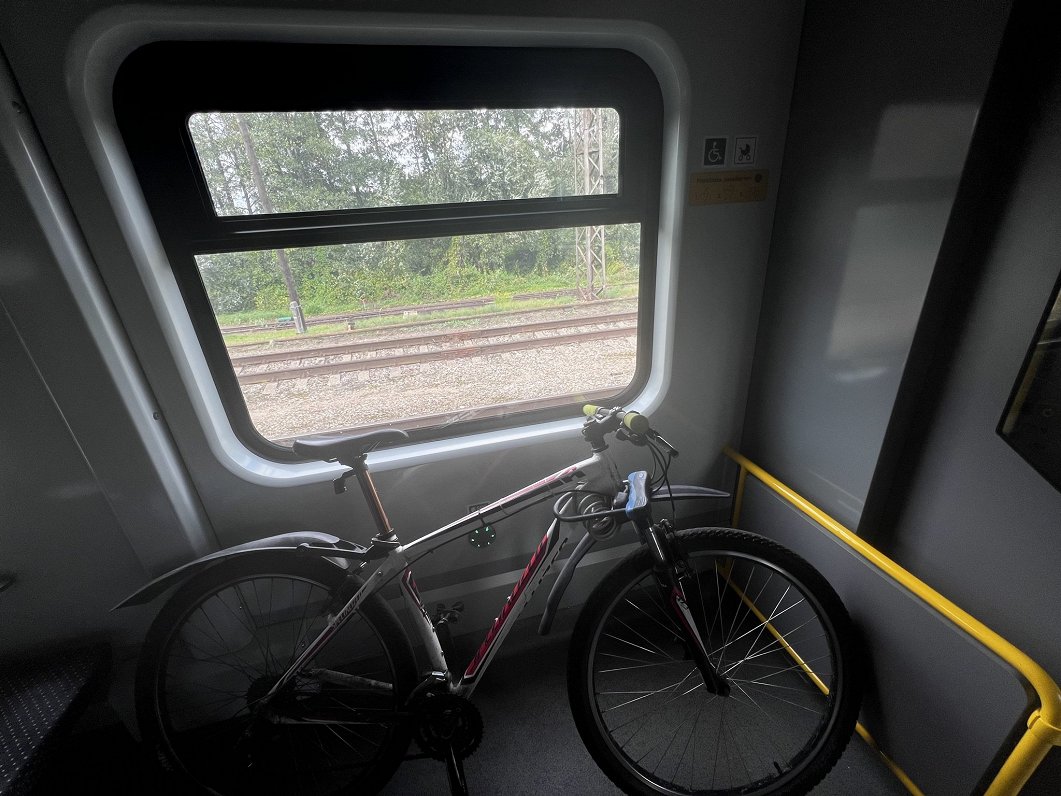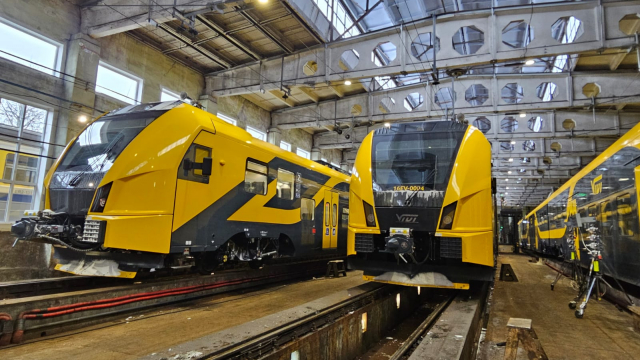Despite much talk of inter-modal and environmentally friendly transport, a rather obvious omission was noticed when the new Škoda trains began running on the network – a complete absence of bicycle racks, almost as if they hadn't even been thought of at all when placing the multi-million euro order for new trains.
Back in May, the Ministry of Transport predicted that the bicycle racks would be installed in the first trains by the end of the summer, at a cost of more than a million euros.
During the past months, the estimated costs appear to have shrunk considerably, as discovered by Latvian Radio's reporter. But this in turn raises the question: does this simply mean that electric trains will be able to carry fewer bicycles than previously promised?
Pasažieru vilciens (Passener train), the company that operates Latvia's passenger rail services now hopes that the first trains equipped with bike racks will start running in January.
In the middle of the working day, Latvian Radio saw few cyclists on the trains between Riga, Jurmala and Saulkrasti – the summer tourist season is now in the past. Those that do have bicycles place their vehicles in the first and last carriage in the area primarily reserved for people in wheelchairs and parents with prams. A student who was traveling from Carnikava to Lilaste parked his bicycle there.
"In the old [trains], it was better to place them [bicycles], you could have several. For example, if I want to ride with someone else who has wheels, you can't put two or three together," he says.
In the mornings and evenings, when there are more passengers, bicycles tend to be left at the door itself, thus creating an obstacle for passengers. Such observations are made by Latvijas Radio, sometimes noticing that unsecured bicycles all over while the train is moving as there is no means of securing them, as there would be if a bike rack existed. It also means that if there is someone on board in a wheelchair or with a stroller, bicycles must go somewhere else.
At Riga Central Station, Latvijas Radio observed that a woman with an infant in a stroller was getting off the electric train. "The thing about summer is that there are a lot of cyclists, and there are a lot of new mothers with strollers. There's just not enough space for all of us," she says.
When asked if bicycle racks are necessary, she replies that they would probably be useful in the summer in certain carriages. "Once a person with special needs wanted to enter and there was simply no more space on the train," the woman recalls.
It was hoped that the bike racks which, astonishingly, were not originally included in the purchase of the shiny trains, would be installed in all 32 new electric trains by mid-summer or at the latest by the end of the summer. The Ministry of Transport had such a plan in January. In May, those in charge said that in the summer they will start setting up the bike racks, and all the trains will be equipped by May of next year. In order to achieve this, it is planned to dismantle six seats in the first and last carriage of each train, and install folding seats in their place.
Like a wardrobe
"In principle, I think it's a crime not to plan this properly. Then it would have been cheaper. Now you have to take the seats out. Imagine you buy a wardrobe and then you think you're going to buy the doors separately. You throw out the new doors and then you buy and put in another door. Well, where's the logic?" asks Romāns Melņiks, member of the board of the Association of Latvian Cyclists and journalist.
He points out that cyclists need a separate space, as is currently the case for people in wheelchairs and parents with prams. By dismantling several seats, he says, bike racks can be created very quickly. On the other hand, this should have been thought of years ago.
"For example, those vertical lifting racks that were offered, which were quite expensive, are only suitable for long-distance travel. If I have to travel one stop, for example, from Pārdaugava to the center, I will not lift [the bike] up. For example, older people - seniors - will not be able lift the bicycle up. There must be a simple place to put the bicycle in the wagon without standing over others' feet in the vestibule," he explains.
The plan has not changed since May – up to 12 bicycles will be placed in each electric train both vertically and horizontally. A contract with a manufacturer has been concluded and all materials have been ordered. That's what the "Passenger Train" company says, promising that the current seats for people in wheelchairs and parents with children will remain in the future. The company hopes that the first trains equipped with bike racks will start running in January. At the same time, company representative Edgars Butāns admits that the coordination of contracts and procurement took longer than predicted, so given the track record of this particular purchase, urther delays would not come as a complete surprise.
"The first three electric trains will be equipped by the manufacturer itself, while the rest of the electric trains will be equipped by our technical staff under the supervision of the manufacturers. Basically, by reducing in this way not only the total project implementation time – we plan that all electric trains should be equipped with bike racks by May next year – but at the same time costs will be reduced by more than 300,000 euros," says Butāns.
Out of the previously estimated 1.2 million euros, the project will now cost around 890,000 euros, most of which will be covered by the European Union, while 15% will be taken from the state budget. This means that providing each place for a bicycle will cost more than 2,000 euros.
























